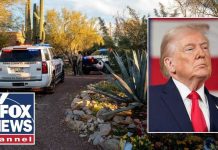
The Pentagon’s decision to start pulling National Guard troops out of Los Angeles raises the question: was this show of federal force ever about safety—or was it just another episode in the endless political theater between Washington and California’s liberal leaders?
At a Glance
- Pentagon begins withdrawing 2,000 National Guard troops from Los Angeles following weeks of unrest and legal wrangling.
- Governor Newsom and Mayor Bass continue to fight the deployment, calling it federal overreach and a misuse of Guard resources.
- Legal battles over the Posse Comitatus Act remain unresolved, with the courts set to weigh in on the limits of federal power.
- Thousands of Guard members remain under federal orders as tensions over immigration enforcement simmer in California.
Pentagon Moves to Scale Back National Guard Presence in Los Angeles Amid Backlash
The Pentagon’s move to release 2,000 California National Guard troops from Los Angeles reflects an uneasy truce after weeks of confrontation between the Trump administration and California’s Democrat leadership. These troops, drawn from the 79th Infantry Brigade Combat Team, were initially sent under Title 10 orders to protect federal agents and property after violent protests erupted in June over ICE raids targeting illegal immigration. What started as a federal mission to restore order quickly became the latest flashpoint in the ongoing battle between states’ rights and Washington’s authority.
When the first boots hit the ground, state and city officials didn’t waste a second denouncing the move. Governor Gavin Newsom and Mayor Karen Bass both blasted the deployment as an attack on local sovereignty, raising legal challenges based on the Posse Comitatus Act—which, if you didn’t know, is supposed to keep the military out of law enforcement. Lawsuits flew, op-eds raged, and the courts scrambled to keep up as federal and state leaders turned Los Angeles into ground zero for their ideological turf war.
Political and Legal Showdown: States’ Rights Versus Federal Orders
For weeks, Los Angeles looked less like a city and more like a backdrop for a political cage match. The National Guard’s mission, the Pentagon insisted, was strictly to protect federal property and support ICE—not to police the streets. But try telling that to residents who saw armored vehicles and riot gear outside government buildings. Mayor Bass didn’t mince words, calling the Guard’s withdrawal a “retreat” and crediting local resistance for forcing Washington’s hand. Governor Newsom doubled down, blasting the deployment as a “political stunt” that drained resources needed for wildfire season.
Meanwhile, the legal wrangling is far from over. A federal court already ruled that the deployment violated the Posse Comitatus Act, only for an appeals court to put that decision on ice. Now, as the remaining 2,100 Guard members from the 49th Military Police Brigade stay on federal orders, the courts prepare to weigh the real limits of executive power. The stakes? No less than the balance between federal authority and the rights of states to control their own Guard units—a battle that could set precedent for decades to come.
Impact on Communities, Law Enforcement, and Conservative Values
The Guard’s partial withdrawal will certainly calm some nerves in Los Angeles, but the underlying issues are far from settled. Local residents and protesters endured weeks of disruption as ICE operations, federal law enforcement, and military support collided on city streets. Guard members—many of whom have civilian jobs and families—faced whiplash from conflicting orders, caught between state leaders demanding their return and Washington insisting on their presence. Amidst the chaos, concerns about mission clarity, wasted resources, and the politicization of our military have only grown louder.
For those who believe in law and order, the situation is a sobering reminder of what happens when progressive politicians put ideological fights above public safety. The deployment was never about turning the military against our own people; it was about protecting federal agents and property when local authorities refused to cooperate. Yet, as the courts sort out the legal mess, one thing is clear: this is a cautionary tale of what happens when Washington overreaches, states dig in their heels, and American communities get caught in the crossfire.
Sources:
National Guard.mil: Cal Guard conducts exercise during real-world challenges
Task & Purpose: 2,000 National Guard troops head home after LA federal mission









